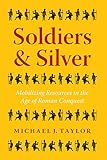Soldiers and Silver : Mobilizing Resources in the Age of Roman Conquest / Michael J. Taylor.
Material type: TextPublisher: Austin : University of Texas Press, [2022]Copyright date: ©2020Description: 1 online resource (256 p.)Content type:
TextPublisher: Austin : University of Texas Press, [2022]Copyright date: ©2020Description: 1 online resource (256 p.)Content type: - 9781477321690
- 937/.05
- online - DeGruyter
| Item type | Current library | Call number | URL | Status | Notes | Barcode | |
|---|---|---|---|---|---|---|---|
 eBook
eBook
|
Biblioteca "Angelicum" Pont. Univ. S.Tommaso d'Aquino Nuvola online | online - DeGruyter (Browse shelf(Opens below)) | Online access | Not for loan (Accesso limitato) | Accesso per gli utenti autorizzati / Access for authorized users | (dgr)9781477321690 |
Frontmatter -- Contents -- Acknowledgments -- Introduction -- Part I. Manpower -- Chapter One Roman Manpower -- Chapter Two Rival Manpower -- Part II. Finance -- Chapter Three Roman Finance -- Chapter Four Rival Finance -- Conclusions -- Appendix: A Note on Ancient Demography -- Notes -- Bibliography -- Index
restricted access online access with authorization star
http://purl.org/coar/access_right/c_16ec
By the middle of the second century BCE, after nearly one hundred years of warfare, Rome had exerted its control over the entire Mediterranean world, forcing the other great powers of the region—Carthage, Macedonia, Egypt, and the Seleucid empire—to submit militarily and financially. But how, despite its relative poverty and its frequent numerical disadvantage in decisive battles, did Rome prevail? Michael J. Taylor explains this surprising outcome by examining the role that manpower and finances played, providing a comparative study that quantifies the military mobilizations and tax revenues for all five powers. Though Rome was the poorest state, it enjoyed the largest military mobilization, drawing from a pool of citizens, colonists, and allies, while its wealthiest adversaries failed to translate revenues into large or successful armies. Taylor concludes that state-level extraction strategies were decisive in the warfare of the period, as states with high conscription and low taxation raised larger, more successful armies than those that primarily sought to maximize taxation. Comprehensive and detailed, Soldiers and Silver offers a new and sophisticated perspective on the political dynamics and economies of these ancient Mediterranean empires.
Mode of access: Internet via World Wide Web.
In English.
Description based on online resource; title from PDF title page (publisher's Web site, viewed 27. Jan 2023)


